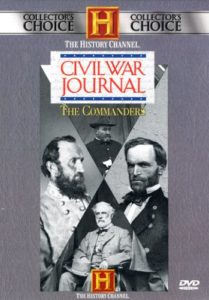Tom Roza presents the DVD “History Channel/Civil War Journal: West Point Classmates – Civil War Enemies”
 The Presentation: “Civil War Journal” is The History Channel’s series that chronicles the happenings of the American Civil War through the memoirs of those who took place in it.
The Presentation: “Civil War Journal” is The History Channel’s series that chronicles the happenings of the American Civil War through the memoirs of those who took place in it.
The episode entitled “West Point Classmates – Civil War Enemies” focuses on the story of a special fraternity of men who attended the US Military Academy at West Point in the years leading up to the start of the Civil War. The program features such Civil War notables as: Robert E Lee, Ulysses Grant, Stonewall Jackson, William Sherman, Jefferson Davis, and George Pickett among others some of whom while cadets at West Point, became close friends and comrades, but often ended up facing each other on the battlefield.
This 43-minute program effectively communicates how West Point training influenced the eventual outcome of the war and how the camaraderie and relationships that were fostered at West Point in the end were instrumental in how the war ended.
The Presenter: Tom Roza has been a student of history in general for the past 60+ years and became an avid historian of the American Civil War beginning in 1961 during the 100 year Centennial of that great conflict. Tom’s professional career spanned 48 years in the field of Information Technology until he retired from in 2013.
During over five decades of studying the Civil War, Tom’s main interest has primarily focused on the human interest aspects of the people involved and affected by that event. Tom’s recently published novel, “Windows to the Past – A Virginian’s Experience in the Civil War” effectively examines and portrays the impact on everyday people living in the South of the political, social, and economic factors that first led to secession, then Civil War.
Tom has been a member of the South Bay Civil War Roundtable organization since 2008 and is currently an officer and Secretary for that organization. Tom has made numerous presentations to both his Roundtable organization and other organizations on topics such as: Confederate Cavalry Generals Nathan Bedford Forrest and Jeb Stuart, Union Cavalry General John Buford, and Union Infantry Generals Winfield Scott and Robert Gould Shaw.
